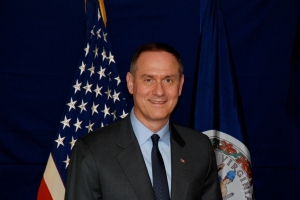VA lawmakers consider enshrining privacy protections in constitution

PRIVACY: State Delegate Richard Anderson, pictured, and state Sen. Chap Petersen are considering trying to enshrine privacy protections into the state constitution.
By Kathryn Watson | Watchdog.org, Virginia Bureau
ALEXANDRIA, Va .— With technology outpacing privacy laws, Virginia lawmakers are trying to plan for the unexpected.
Democratic state Sen. Chap Petersen and Republican state Delegate Richard Anderson are looking to prohibit state agencies and law enforcement from using any technology — think automatic license plate readers, call databases and drones — to passively collect and then keep personal information without a warrant.
Anderson said he may even try to push a constitutional amendment, which is harder to get than a law but also virtually impossible to alter.
Months of meetings attended by the two co-chairs of the Ben Franklin Privacy Caucus have led them to the same conclusion — people don’t want their government spying on them.
“I am still in a place where I think that we essentially have a choice,” Anderson told Watchdog.org on Monday. “We can trade away a little bit of liberty, in exchange for some greater degree of security. And I would actually rather err on the side of liberty.”
Some lawmakers were unsettled to learn last year police departments are still randomly collecting license plate information and storing it for months, despite an attorney general opinion calling the practice illegal. Thus, the Ben Franklin Privacy Caucus was born.
Anderson and Petersen are still nailing down the specifics, keeping the language broad enough to include any kind of technology that is, as of yet, uncreated. Police agencies, which Anderson realizes may not be comfortable with this kind of restriction, still have time to present their cases. Law enforcement has been vocal about how useful stored information, such as license plate data, can be.
The U.S. Constitution, Anderson said, provides something in broad terms that Virginia’s state constitution doesn’t — prohibitions against unreasonable search and seizure through the Fourth Amendment.
“We in Virginia don’t have a provision like that in our constitution,” Anderson said. “So I am working right now with attorneys on some sensible and clear language to insert in the state constitution, and I would like to do it this year, if in fact I decide to move forward with it.”
A constitutional amendment, or even a law, would codify a 2013 official opinion from former Attorney General Ken Cuccinelli. Cuccinelli, in an opinion that gained rare agreement from the far left and far right alike, said police authorities have no right to randomly collect and keep people’s license plate information without a warrant.
Petersen and Anderson filed the privacy bills to amend the law this year, but they were continued until 2015 to gather public input. Petersen’s bill was automatically re-filed for 2015, but Anderson will need to resubmit his.
The text from their twin 2014 bills reads, “Unless a criminal or administrative warrant has been issued, law enforcement and regulatory agencies shall not use any technology to collect or maintain personal information in a passive manner where such data is of unknown relevance and is not intended for prompt evaluation and potential use respecting suspected criminal activity or terrorism by any individual or organization.”
For something to be enshrined in the state constitution, it must pass both chambers of the General Assembly two consecutive years, with an election in between those two legislative sessions. Then it goes to the ballot for the people to decide. It’s a lengthy, grueling process, providing that only measures with strong support from lawmakers and the public pass. With statehouse elections coming up in 2015, Anderson said this is the time to try.
“Now is the year,” Anderson said.
“That way, we will at least provide broad constitutional guidelines on the employment of technology in collecting what many people feel are private data that should not be disclosed to government,” he added.
Kathryn Watson is an investigative reporter for Watchdog.org’s Virginia Bureau, and can be found on Twitter @kathrynw5.







